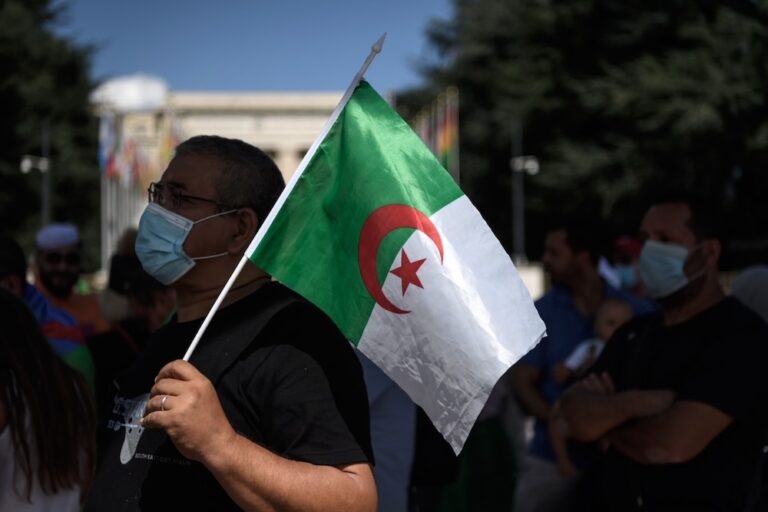(PINA/IFEX) – The following is a 21 February 2003 PINA news release: Geneva – The Pacific Islands News Association (PINA) and other news media groups now in Geneva, Switzerland, have stressed: Article 19 of the Universal Declaration of Human Rights is fundamental to any World Summit on the Information Society declaration. The news media stand […]
(PINA/IFEX) – The following is a 21 February 2003 PINA news release:
Geneva – The Pacific Islands News Association (PINA) and other news media groups now in Geneva, Switzerland, have stressed: Article 19 of the Universal Declaration of Human Rights is fundamental to any World Summit on the Information Society declaration.
The news media stand comes amidst lobbying during the two-week second preparatory committee meeting (PrepCom-2) for December’s summit in Geneva.
The news media organisations represented in Geneva for PrepCom-2 jointly said:
“Article 19 needs to be implemented, for the traditional media including radio and television, as well as for media using new information technologies, such as Internet and Direct Satellite Broadcasting.
“Security and other considerations should not be allowed to compromise Freedom of Expression and Freedom of the Media.”
Article 19 says: “Everyone has the right to freedom of opinion and expression; this right includes freedom to hold opinion without interference and to seek, receive and impart information and ideas through any media and regardless of frontiers.”
The news media organisations at PrepCom-2, known as the media group, said the media have a vital role in producing, gathering and distributing quality content. This is within an Information Society in which all citizens are included and can participate.
“Especially for the developing countries, traditional radio and television will continue as the most effective ways to deliver high-quality information,” they said.
The media group said the news media are central to any conception of an Information Society.
It is hard to imagine that the World Summit on the Information Society could fail to acknowledge that strongly in its final Declaration and Plan of Action, the media group said.
The media group said these messages should be developed along the following lines:
– Freedom of expression, freedom and pluralism of the media and cultural diversity should be respected;
– Public service values in the Information Society should be encouraged, including genuine public service broadcasting;
– State-controlled media should be transformed into editorially independent public service organisations;
– Editorial independence of media professionals and creators must be protected;
– Legally established independent and non-profit media operated by local communities can make an important contribution, especially by serving traditionally disadvantaged groups such as youth, women, indigenous peoples, children and minority groups;
– Uniform legal protection of communications privacy is needed to avoid governmental or other interference and official monitoring of Internet traffic and personal communications;
– Communications technology is not an end in itself, it is a vehicle for the provision and exchange of information and content;
– Information and media development programmes are needed to promote local content services in all regions of the world, as well as access to basic communications technology.
PINA, the main professional association of the Pacific Islands news media, is represented in Geneva by its president, Johnson Honimae, general manager of Solomon Islands Broadcasting Corporation.
PINA also sent a team to the Asia-Pacific preparatory conference in Tokyo last month. This was led by Nina Bolaitamana Ratulele, of the Fiji Islands, PINA Administrator and coordinator of the PINA Pacific Freedom of Expression Network.
In Tokyo, PINA highlighted a call from a recent UNESCO symposium, which said: “A true information society cannot be conceived without guaranteeing freedom of the press and the media.”
PINA shared concerns of UNESCO representatives in Tokyo that moves on “appropriate” content and protecting “vulnerable” groups could threaten such freedoms.
Questions raised included: Who will define ‘appropriate content’ – Governments? Who is a ‘vulnerable group’? What kind of ‘protection’?
PINA, UNESCO representatives and other news media groups in Tokyo got the rights to freedom of expression and information plus the role of the traditional news media included in the Tokyo Declaration.
The World Summit on the Information Society will occur in two phases:
The first phase will take place in Geneva, hosted by the Swiss Government, on 10-12 December. It will address the broad range of themes concerning the Information Society and adopt a Declaration of Principles and plan of action, addressing the whole range of issues related to the Information Society.
The second phase will take place in Tunis, hosted by the Tunisian Government, in 2005. Development themes will be a key focus in this phase, and it will assess progress that has been made and adopt any further plan of action to be taken.


